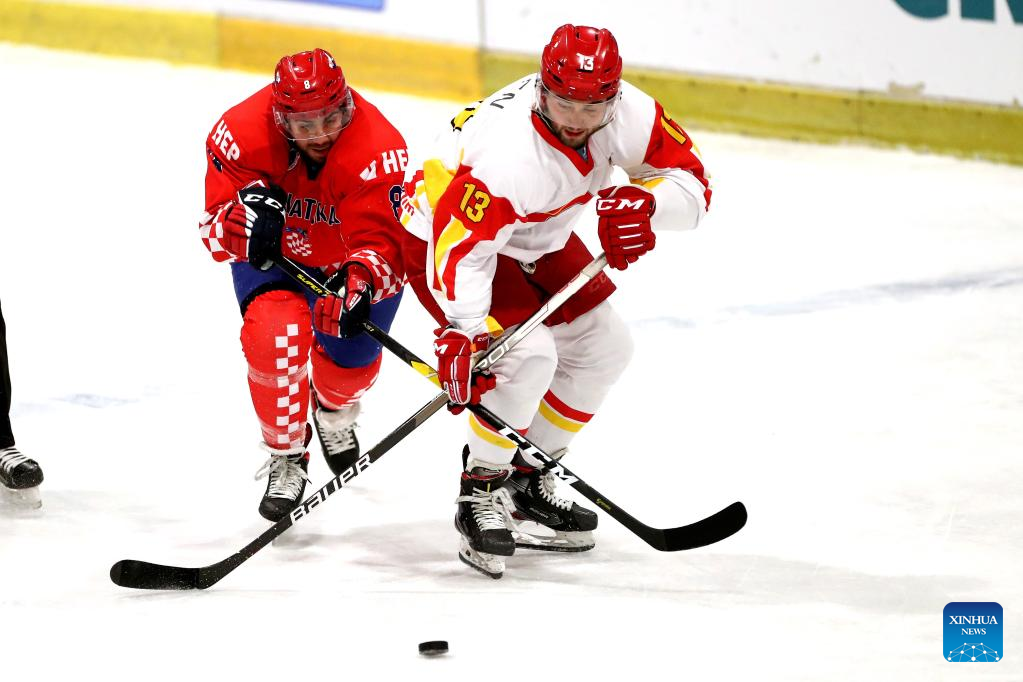Pucksters posed Olympic challenge
 0 Comment(s)
0 Comment(s) Print
Print E-mail China Daily, July 15, 2022
E-mail China Daily, July 15, 2022

With a renewed emphasis on league development and global talent cultivation, China's reshuffled ice hockey governing body has set clear and more realistic goals for the new Olympic cycle.
Five months after doing the country proud at the home Olympics, the Chinese Ice Hockey Association detailed its targets for the next Games-to qualify the men's team through the rankings, as opposed to directly entering Beijing 2022 as the host, and to prepare the women's team for a top-six finish at the 2026 Games in Milan and Cortina d'Ampezzo.
The vision was unveiled on Wednesday during the inaugural meeting of CIHA's leadership, which is now headed by newly elected president Wang Xuan, with Shen Zhengang and Zhang Dan serving respectively as the vice-president and secretary general.
Reflecting on the success at Beijing 2022, Wang reiterated that to develop a competitive national program capable of qualifying for 2026 ranks high on the association's agenda under his helm.
"Having been there as the host, we are now aiming to make our way back into the Olympics on our own," said Wang, a former official from the General Administration of Sport of China who was in charge of ice hockey preparations for Beijing 2022.
To close the gap to the world's best in such a physically demanding sport, the CIHA is planning to build a sound domestic league system channeling junior events up to the professional level, expand ice hockey's promotion in schools, upgrade youth training at commercial clubs and continue the global talent search to bolster the national teams.
Liu Guoyong, a deputy director of the GASC, China's central sports governing body, reckons that a consistent approach to developing ice hockey stays in line with the country's goal of building a world sporting power over the next decade.
Liu added that the CIHA will continue with the system that proved so effective in shaping Team China's preparations for Beijing 2022. The so-called "National Team Club" program selects players from home and abroad, trains them at national camps and then forms them into teams to compete in major overseas leagues.
As a late starter in the sport traditionally dominated by North American and European powers, China wouldn't have made the 2022 Olympic tournaments via the usual qualifying route, with its men's and women's teams both ranked far off the entry cuts prior to the Games.
The International Ice Hockey Federation, however, voted in May 2018 to grant China automatic berths at Beijing 2022, hoping to grow the sport in the untapped market of a country that is making good on its pledge to bring winter sports into the mainstream.
To level up its game, the CIHA and its partner club Kunlun Red Star launched an overseas talent program in 2017 to scout and select North American-born players with Chinese heritage to join the national teams.
They were joined by homegrown Chinese talents, with Kunlun competing in the Russia-based Kontinental Hockey League and the Canadian women's league for at least three seasons leading up to Beijing 2022. The initiative built a strong camaraderie on and off the ice, paving the way for the men's and women's teams impressive runs at the home Games.
Despite neither making it to the knockout stages, the Chinese women's team's two straight round-robin wins over higher-ranked Denmark and Japan, as well as the men's squad's brave fights against the sport's giants-the United States, Canada and Germany-won over fans while proving the doubters wrong.
Building on the Olympic momentum, both Chinese teams finished top of their respective men's fourth-and women's third-tier IIHF World Championship tournaments in May. The results secured promotions to higher-level groups next year, while also moving them up the world rankings to step closer to the Olympic cuts.
The men's return to Division I for the first time since 2007, when China hosted the tournament in Heilongjiang province, has helped strengthen many of the heritage players' commitment to the Chinese national program en route to 2026.
"My teammates and I have been training and competing together for five or six years. Our hard work paid off," said Team China captain Ye Jinguang, known as Brandon Yip in his native Canada, after winning the Division II Group A tournament in Croatia.
"It's a long way to Italy (for the 2026 Winter Olympics) and we have a few more championships to win, but we are just gonna take it step by step," added Ye, a 37-year-old former NHL player who has been playing with Kunlun Red Star since 2017.
Impressed by the massive fan following during the Beijing Games and the Chinese governing body's long-term strategies, the IIHF remains bullish on ice hockey's future in China.
"When China played Japan (in the women's tournament at Beijing 2022) 90 million people were watching the broadcast. These numbers are unbelievable," IIHF president Luc Tardif said at a news conference in February in Beijing.
"We are more prepared to bring ice hockey to China. These Olympic Games were the first step. We have more time in front of us to bring ice hockey to China in a sustainable way. It's not going to be tomorrow, it will be long term."
With the 2021-22 international season now concluded, it's time for the CIHA to focus more on realizing its promise of developing a true domestic league, where teams compete on a weekly basis throughout a season, rather than the previous one-off tournaments.
"It takes 10, 12, 15 years until the system really produces great hockey players," said Petr Briza, an IIHF council member.
"Team China worked really hard on the participation for these Olympic Games. They played great games. We want to continue cooperating with them and show how to improve hockey."






Go to Forum >>0 Comment(s)